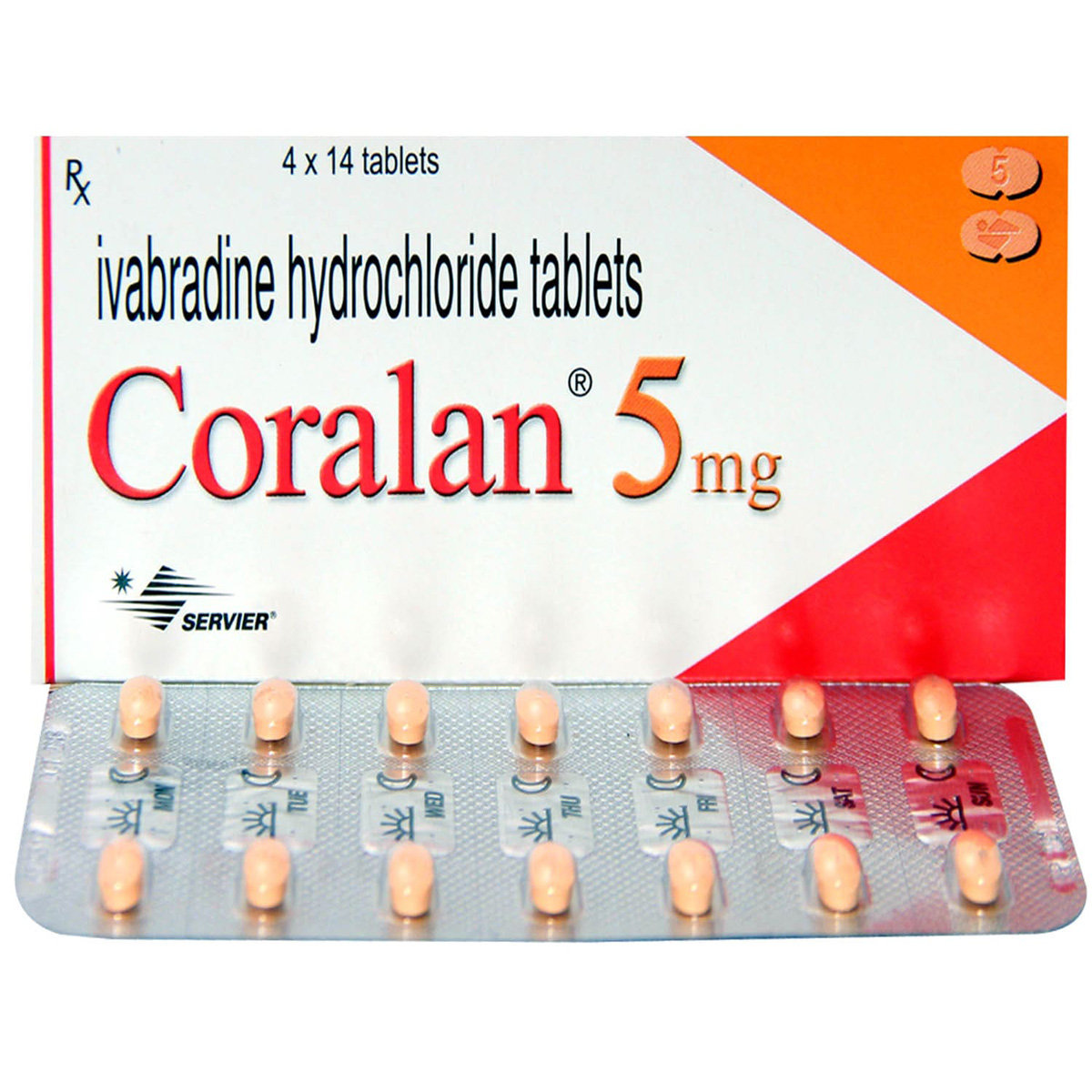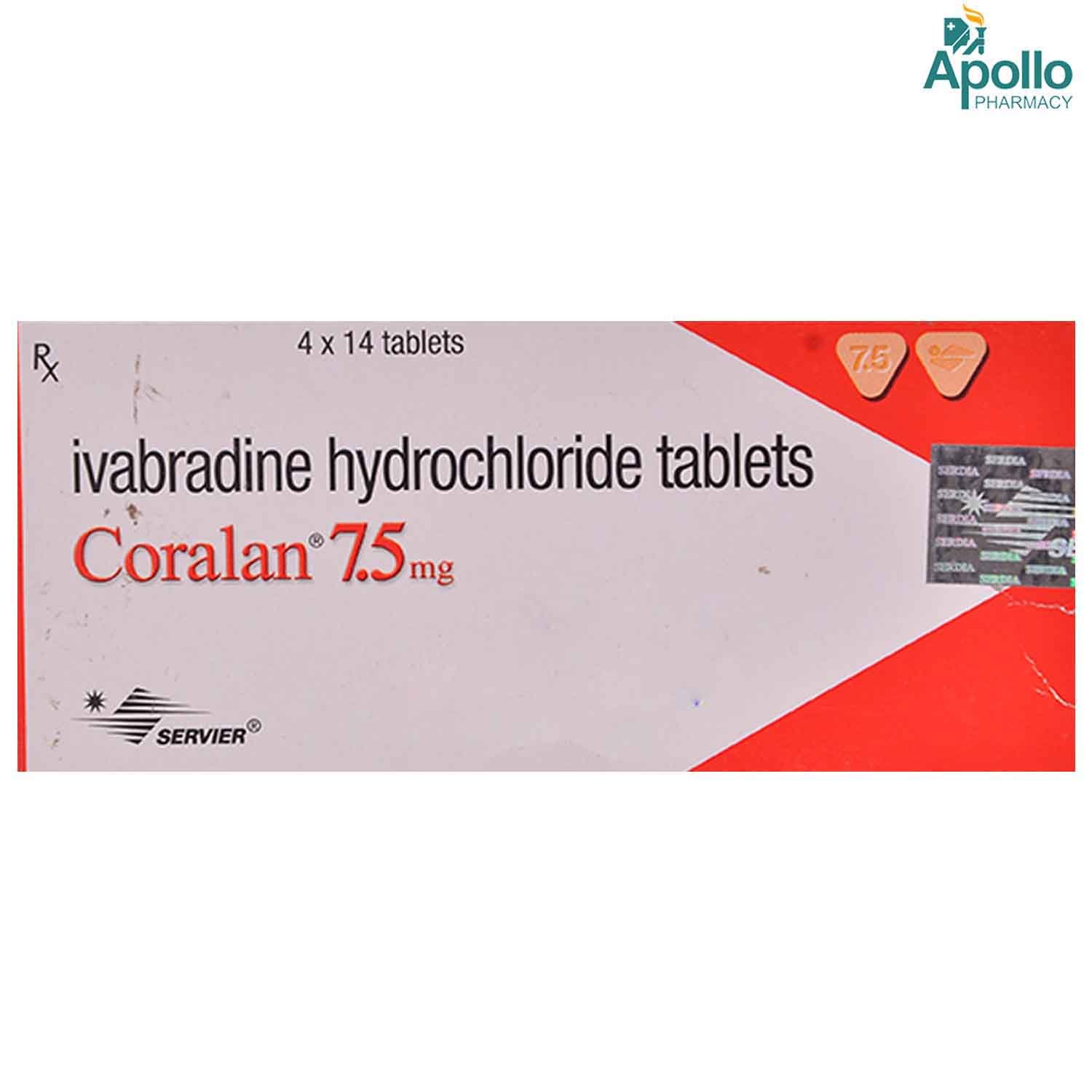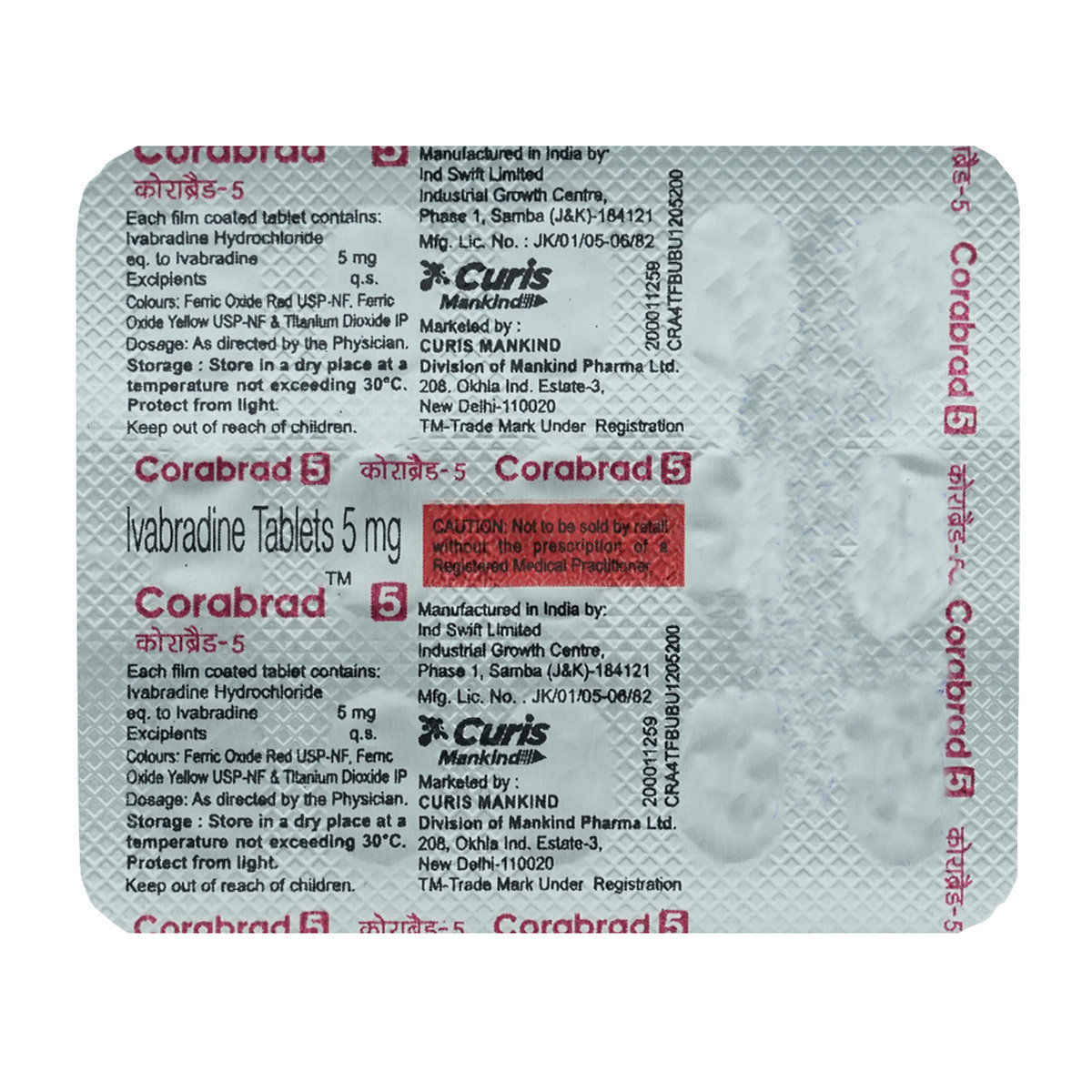Ivabradine
About Ivabradine
Ivabradine belongs to the class of medications, namely hyperpolarization-activated cyclic nucleotide-gated (HCN) channel blockers. It primarily treats symptomatic stable angina pectoris and chronic heart failure. In angina, Ivabradine is suggested to adults whose heart rate is over or equal to 70 beats per minute and who cannot take or tolerate heart medicine called beta-blockers. In chronic heart failure, this medicine is suggested with standard therapy for adult patients whose heart rate is over or equal to 75 beats per minute. Angina is a type of chest pain that occurs when the heart does not receive enough oxygenated blood. It is a sign of coronary artery disease and usually happens in people 40-50 years old. Heart failure occurs when muscles in the heart fail to pump enough blood to the whole body, and in turn, the heart fails to function properly. Certain conditions, including narrowed arteries or high blood pressure, may be responsible causes for heart failure.
Ivabradine contains Ivabradine, and it works by reducing the heart rate by a few beats per minute. In this way, it lowers the heart's requirement for oxygen, especially in situations where an angina attack can happen. All of this action control or reduce the chances of more angina attacks.
Ivabradine should be taken as prescribed by the doctor. Seek medical attention immediately if you notice any sign of an allergic reaction, including hives, swelling of the face, lips, and difficulty breathing. The possible side effects of using Ivabradine include feeling tired, irregular or rapid feeling heartbeat, headache, dizziness, visual impairment or blurry vision. Ivabradine may increase the brightness of the eyes, especially during the first two months after starting the treatment. These effects will pass with time or after the completion of treatment.
A person dealing with a serious heart condition such as 'sick sinus syndrome is not allowed to take Ivabradine. The usage of Ivabradine is not allowed in persons who are allergic to any of its constituents or pregnant or breastfeeding females or children below 18 years. Keep your doctor informed about your health condition and all the medicines you are taking before taking this medicine to rule out any side effects.
Uses of Ivabradine
Medicinal Benefits
Ivabradine is a heart medicine suggested to treat symptomatic stable angina pectoris and chronic heart failure. Ivabradine comes under the hyperpolarization-activated cyclic nucleotide-gated (HCN) channel blockers that slow the heart rate by a few beats per minute so that the heart can pump more oxygenated blood according to the need of the body. Ivabradine is responsible for reducing oxygen requirement in conditions where the angina attack may happen. In this way, this medicine controls and reduces the number of angina attacks. Additionally, a high rate could affect the functioning of the heart and may cause serious consequences in patients dealing with chronic heart failure. By reducing the heart rate, this medicine improves the heart's functioning and helps improve chronic heart failure.
Directions for Use
Storage
Side Effects of Ivabradine
- Feeling tired
- Irregular or rapid feeling heartbeat
- Headache
- Dizziness
- Visual impairment or blurry vision
Drug Warnings
One should not take Ivabradine if they have pre-existing sick sinus syndrome, liver disease, or have very low blood pressure as Ivabradine reduces the heart rate so that heart can pump more effectively. Before taking this medicine, a person should tell their doctor about their pre-existing medical conditions and ongoing medications. Using Ivabradine is strictly restricted in pregnant women as this medicine may harm an unborn baby. A woman should use effective birth control pills to avoid chances of pregnancy. A person may face serious heart rhythm problems after taking Ivabradine, so if a person notices racing heartbeats, very slow heartbeats, severe dizziness, or tiredness, then they must tell their doctor about it on an immediate basis. The usage of Ivabradine is not allowed in children below 18 years of age. Tell your doctor if you have lactose intolerance, as this medicine consists of lactose.
Drug Interactions
Drug-Drug Interactions: The usage of Ivabradine is not allowed with some medicines as it may interact with some drugs and increase the risk of serious side effects. The possible medications that can interact with Ivabradine include anti-anxiety (lorazepam), antihistamine (diphenhydramine), anti-depression (duloxetine), diuretic medicine (furosemide), neuropathic medication (pregabalin), Paracetamol (acetaminophen), anti-allergy (montelukast). This is not a complete list of drug interactions, so tell your doctor every possible drug, herbal and non-herbal products, you are using.
Drug-Food Interactions: Avoid consuming grapefruit juice while taking Ivabradine as these products significantly increase blood levels that may result in severe side effects. One should also avoid taking alcohol as it may worsen the effects of medication.
Drug-Disease Interactions: The use of Ivabradine is prohibited in patients with conduction disturbances, heart failure, hepatic impairment, hypotension, and renal impairment.
Drug-Drug Interactions Checker List:
Safety Advice

Alcohol
unsafeA person taking Ivabradine is not allowed to consume alcohol as alcohol may worsen the dizziness.

Pregnancy
unsafeIvabradine is not allowed to be used during pregnancy as it may harm an unborn baby or even can cause premature childbirth. Take effective birth control pills and other contraception methods to avoid the chances of pregnancy.

Breast Feeding
unsafeWomen taking Ivabradine should not breastfeed their children as it may pass into breast milk to newborns.

Driving
unsafeA person taking Ivabradine is not allowed to drive or not to operate any machine, especially at night, as this medicine may cause sudden variation in the brightness of the light.

Liver
unsafeIvabradine is not allowed to use in patients with severe preexisting liver disease. However, this medication only is used in patients with liver disease if prescribed by the doctor.

Kidney
unsafeTake Ivabradine is not allowed to use in patients dealing with severe renal disease. Ivabradine does not interfere with the functions of kidneys in cardiac heart failure patients, but still, this medicine can only be used after the doctor's recommendation.

Children
unsafeIvabradine is not allowed to use in children below 18 years unless prescribed by the doctor.
Habit Forming
Diet & Lifestyle Advise
- Create a well-balanced and healthy diet that includes vegetables, fruits, whole grains, legumes, omega-3-rich foods, and lean protein sources.
- Keep your weight under control with a BMI of 19.5-24.9.
- Avoid chronic stress, as it can raise your blood pressure.
- Spend time with your loved ones to cope with stress and practice mindfulness techniques.
- Be mindful of salt; consume no more than 2,300 mg each day.
- Limit or avoid alcohol consumption.
- Quitting smoking is the best strategy to lower the risk of heart disease.
Special Advise
- Angina symptoms can be brought down by including more physical activity and a healthy diet in daily life, so consider the same.
Patients Concern
Disease/Condition Glossary
Stable angina pectoris: This is the symptom of coronary artery disease in which a person faces serious chest pain caused by reduced blood flow to the heart. This disease usually happens when the heart is beating at a faster rate than normal to supply more oxygenated blood to the whole body. People dealing with angina may feel pressure, heaviness, and tightness in their chest. It is hard to differentiate angina from other types of chest pain, such as pain due to indigestion. If a person faces unexplained chest pain, they must seek medical help immediately.
Chronic Heart failure: Chronic Heart failure is also known as congestive heart failure, which happens when the heart fails to pump blood as much as it should. The possible factors include narrowed arteries in the heart, high blood pressure that weaken the heart, and the heart does not pump properly. The possible signs of heart failure include fatigue, rapid heartbeat, increased urge to urinate, rapid weight gain, severe shortness of breath, etc.
FAQs
Ivabradine contains Ivabradine, and it works by reducing the heart rate by a few beats per minute. In this way, it lowers the heart's requirement for oxygen, especially in situations where an angina attack can happen. All of this action control or reduce the chances of more angina attacks.
Yes, a woman should always take every measure, including a birth control pill to prevent pregnancy while taking Ivabradine as this medicine can harm an unborn baby.
No, Ivabradine should not be used in those who are suffering from cardiogenic shock (a potentially fatal condition in which your heart suddenly cannot pump enough blood to fulfil your body's needs).
Reducing heart rate is required in patients dealing with angina and heart failure. When the heart rate gets reduced, the heart can pump more amount of blood into the whole body without affecting the heart's contraction and relaxation.
A person is not allowed to stop their medication without asking the doctor as after checking the heart activity doctor may reduce the dose before directly stopping the drug. A balanced diet, rest, and exercise are important for good heart health, so the doctor may also suggest this before stopping the drug directly.
Yes, a person taking Ivabradine needs to be under strict doctor's guidance as checking the heart starts before the treatment and continues during the whole treatment to check the effects of the medicine. The checking of the heart is done with the help of an ECG.
No usage of Ivabradine is prohibited in persons dealing with sick sinus syndrome, significant hypotension, or third-degree AV block. If you have any concerns regarding this, please discuss them with your doctor.
No, if a person is prescribed to take Ivabradine, they are strictly restricted from taking grapefruit juice as it may worsen their side effects.









